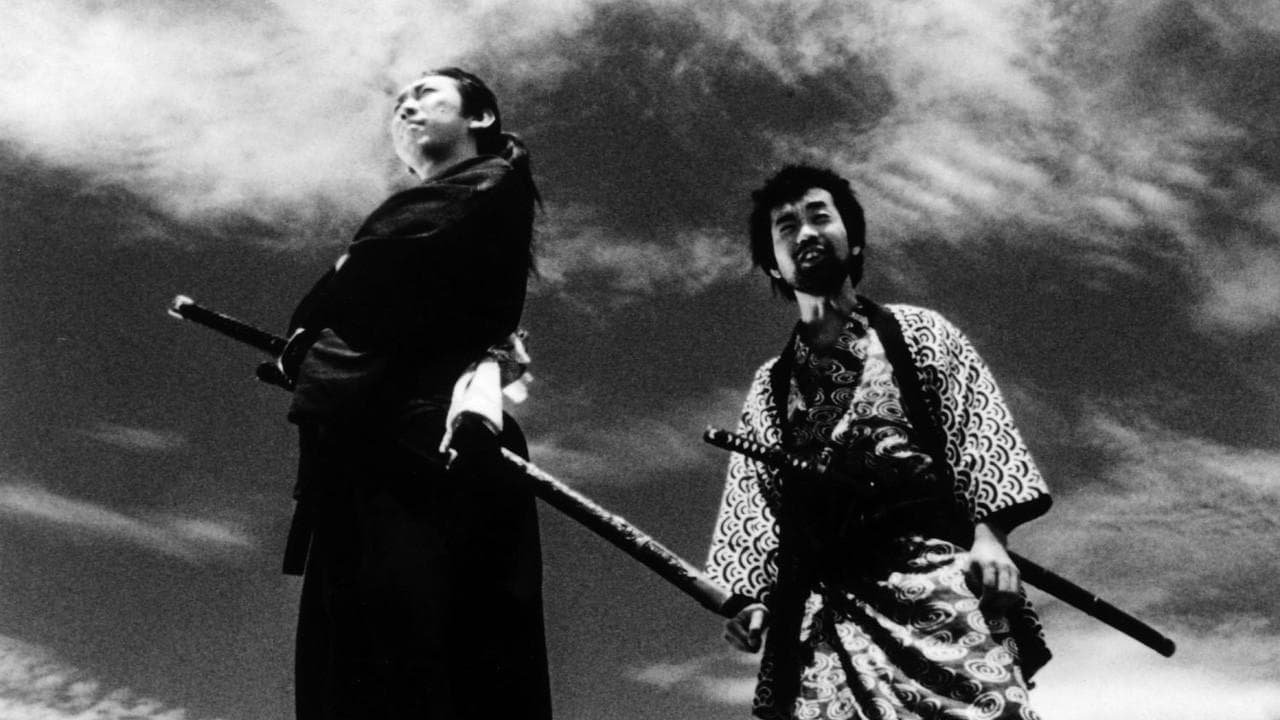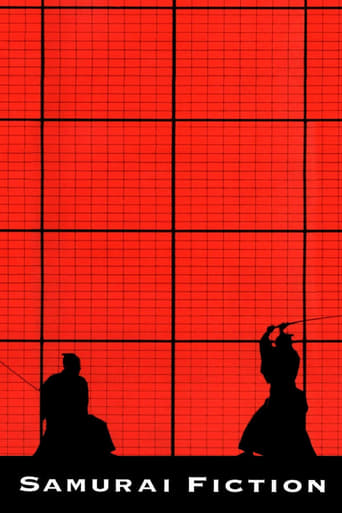



Wow! Such a good movie.
I really wanted to like this movie. I feel terribly cynical trashing it, and that's why I'm giving it a middling 5. Actually, I'm giving it a 5 because there were some superb performances.
View MoreMostly, the movie is committed to the value of a good time.
View MoreStrong acting helps the film overcome an uncertain premise and create characters that hold our attention absolutely.
View MoreDo not be alarmed or adjust your screen; Samurai Fiction is meant to look this way. Samurai Fiction is supposed to look like it was violently ripped out of time and plunged into the late-nineties like the sudden reappearance of the fedora. Yes it feels silly, yes it looks silly but if you manage to see through all the off-kilter, jarringly anarchistic and sinfully stylistic liberties you'll find Samurai Fiction is...well it just is.The plot is set when samurai Kazamatsuri (Hotei) steals a precious sword from his former clan. Against the advice of his father (and basically everyone) the wide-eyed Inukai Heishiro (Fukikoshi) promises to take the sword back from the duplicitous Kazamatsuri. Along the way Inukai meets the elderly Hanbei Kurosawa (Kazama) and his daughter Koharu (Ogawa). After Heishiro has a brief skirmish with Kazamatsuri, the father-daughter pair decide to help him on his quest to recover the clan's sword.If this all sounds like a seemingly flattering emulation of the work of Akira Kurosawa and Kenji Mizoguchi what on earth tipped you off? Was it the details of the plot, the art direction which expertly recreates the period, or was it the fact that characters in the film are literally named after the directors? There is something near- noble about the way director Hiroyuki Nakano attempts to mimic the intensity of the great samurai films of yore. Like the works of Guy Maddin, Samurai Fiction seems to come from a weird parallel universe where the visuals are constructionist but the way the story is told is purely contemporary. You can also tell Nakano cut his teeth on Japanese TV and the works of early Quentin Tarantino to get where he is.Nakano also left his mark as a music video director for MTV Japan and boy can you tell. The largely black and white cinematography clashes with the film's ear-piercing score which features some electric- guitar laden rock music, downright annoying Japanese pop and, I kid you not, the elderly Morio Kazama playing "My Old Kentucky Home" on a musical saw. Nakano also sets up some head- cocking tableaux that for the life of me I can't tell if they're meant to homage 1980's pensive staring by a beach bonfire or lampooning such overused clichés of simmering cool-guy bravado. What's clear is Nakano has created an atonal echo chamber of discordant themes, homages, references and parodies.The DVD/Bluray comes with a very indulgent and very Japanese making- of documentary called Samurai Non-Fiction. In it you can see producers and crew members look on with puzzlement and confusion while Nakano explains his goals for the film. "I've only recently seen some of the old movies. I like them but they could be better." In the background cinematographer Yujiro Yajima squirms uncomfortably as we cut to one of the producers quite frankly expressing his doubts that Nakano can pull off his crackpot, MTV- infused vision for samurai films in the new millennium.Samurai Fiction, despite it's attempt to try something new, is not a great film. The story is un-engaging adding nothing as far as post- modern commentary or new twists and turns. To stop audiences from being lulled into a stupor, the film exposes itself with a topsy- turvy array of bold stylistic choices and odd blaring musical interludes that do nothing but draw attention to themselves. Garish, cartoony and stuck in time, Samurai Fiction might just be unique enough to garner a cult following. But for those who care for actual samurai fiction, or failing that a passing interest in decent movies, I wouldn't bother with Samurai Fiction.
View MoreI feel rather bewildered after reading some of the comments on this board. They all seem rather positive towards this film whereas throughout watching all I could think of was how awful it actually was.First of all, I felt the ronin-come anime character Kazamatsuri was of particularly poor casting. Tomoyasu Hotei may be a famous singer and guitarist in Japan, but that doesn't make him an ideal role as lead antagonist. first of all, his mannerisms and overall presence on screen was so far beyond anything we have come to expect from samurai behaviour that it comes off looking more like an anime character than a serious master swordsman. Besides his innate ugliness, he commands no presence on screen, certainly not comparable to the great Toshiro Mifune and any comparison is an insult to Mifune's genius. This is even more evident when he comes up against aging samurai Mizoguchi who has his act down perfectly. The good vs the bad here of the characters is mirrored in the actors' performance, screen presence and overall commanding of the samurai behaviour.Many have also noted the shooting style of director Hiroyuki Nakano. While its obvious in parts he has tried to emulate Kurosawa in style, and in few cases does so very well, too often do we see his true understanding (or lack thereof) of the cinematic artform. His style comes off more like a University graduate than a Japanese professional. The black and white, while understood in its use, is again not used to its fullest as the film was shot in colour and simply desaturated in post. This loses the clarity that black and white film usually allows, leaving us with footage that has all the disadvantages of colour and none of the advantages of black and white.Lastly, I have to mention the appalling soundtrack. I'm all for putting a fresh spin on an old genre, but this eighties heavy rock simply does not fit. It seems that people are too obsessed with having the music achieve something not done before in samurai films that they don't pay attention to whether or not it is any good. While it may be perceived that I did not get what the film makers were trying to achieve, I think that is wrong. I understand the need to try and breath new life into an aging genre, but I think that this is not that man to do so, and that this is certainly not the method of going about it. While the film wants to be a comedy in many areas, it also tries very hard to have serious undertones and comes off not knowing which is the most important to the film. If this is the samurai genre for the MTV generation then I want no part of it. Twilight Samurai is a much better representation of modern samurai storytelling and I think that should be the direction film makers should be taking the genre. Leave the MTV generation Battle Royale and let true samurai fans have quality like Twilight. This amateurish movie isn't needed here.
View More"Samurai Fiction": Definitely worth watching - I thought it was a little slow at first (and a little sparse and inconsistent with the humour), but it definitely got better at the end. It won't make you more of a Hotei Tomoyasu fan (boy, he looks weird - almost like a manga character... like "Jei" in Stan Sakai's "Usagi Yojimbo"), and the swordplay won't exactly blow you away, but the adaptation of the black & white (with selective colour, a la "Rumblefish") genre is excellent. Being a Kurosawa fan, I especially liked the general "feel" of the cinematography and the video transfer, as it was digitally modified to add graininess and capture that circa-1950's TOHO ambiance. Critical attention was paid to camera angles, set design, character development and mannerisms, all playing true to the Kurosawa-esque model and at the same time sparing no opportunity for the sight gag and comedic element. Yes, for the Hirosue Ryoko fans-in-denial, the female lead (Ogawa Tamaki) bears a somewhat close resemblance (slightly less boyish), but that's besides the point. The movie felt like it was part of an Ulfuls music video at times (I think it was "Guts Daze"), which was exactly what made it so good. Highly recommended.
View MoreMusic video director Nakano Hiroyuki offers his superb feature film debut, photographed in brilliant black and white. The film moves at a rapid pace, filled with episodes of great swordplay action and a number of hilarious antics. Popular Japanese guitarist Hotei Tomoyasu not only provides the movie's excellent soundtrack but also portrays the powerful samurai master Kazamatsuri. Terrific performances all around, but it's Fukikoshi Mitsuro as the wonderfully silly Inukai Heishiro and Ogawa Tamaki as the strong-willed Koharu (Heishiro's love interest) who steal the movie.
View More